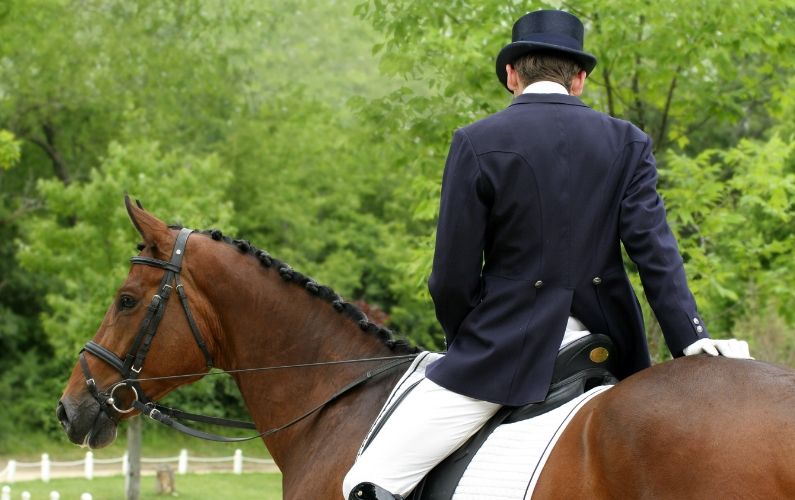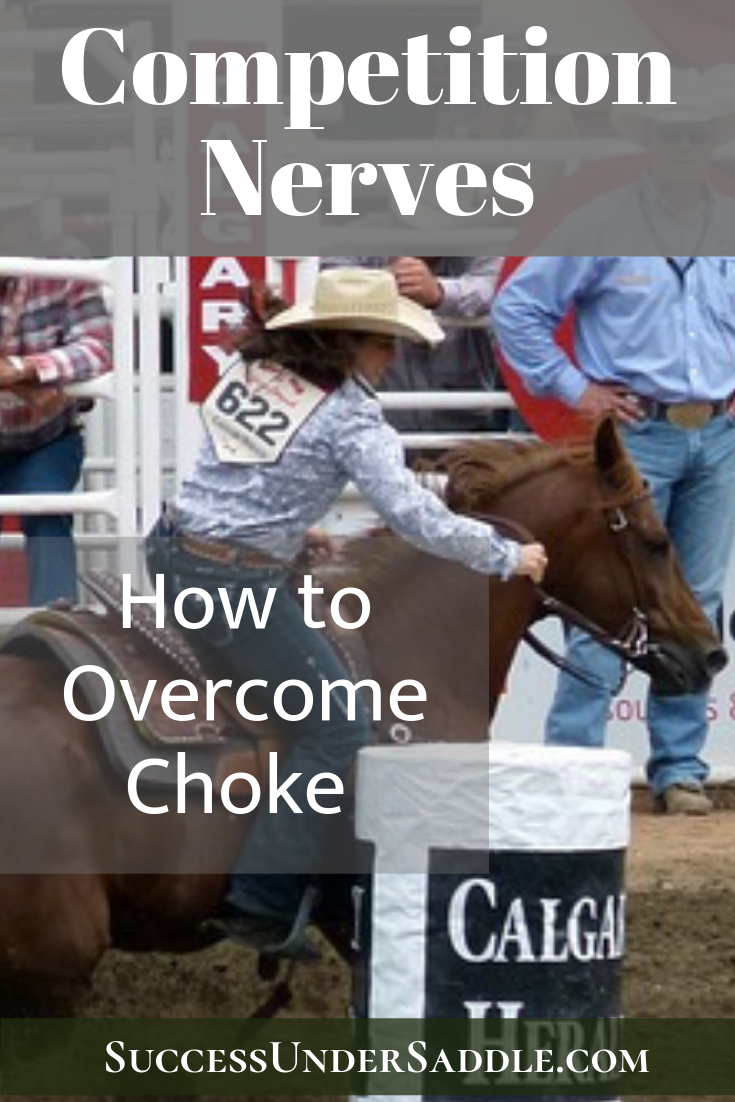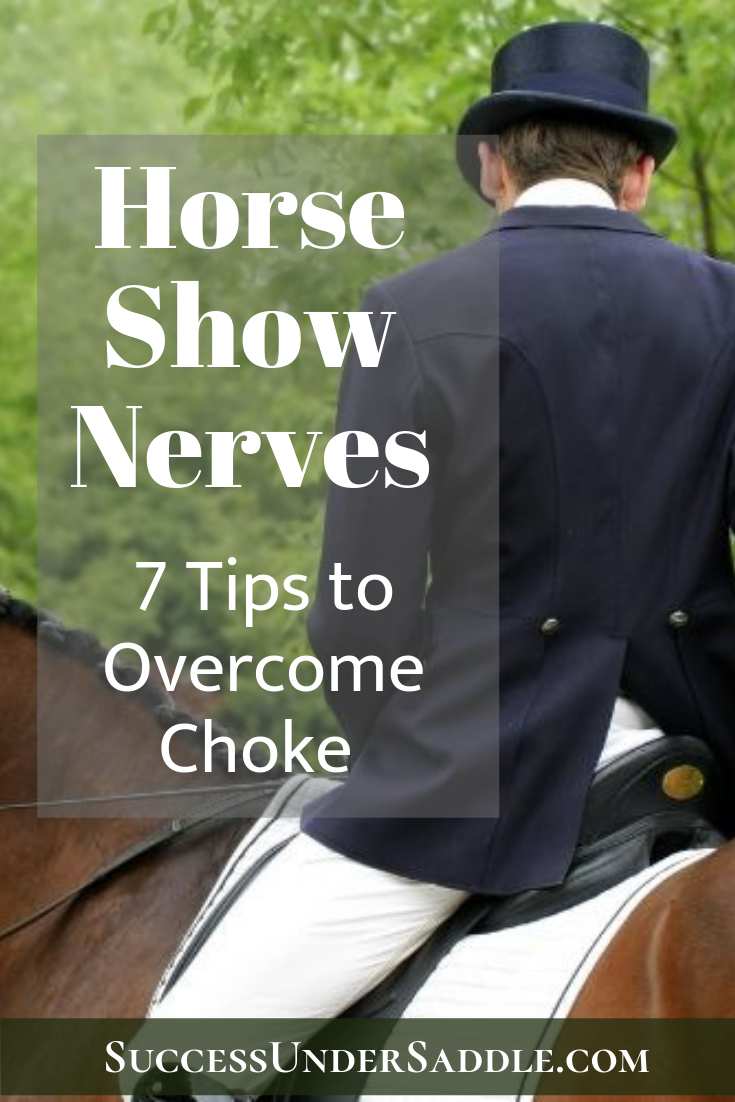This post may contain affiliate links. Please read our disclosure for more info.
Have you ever choked in a horse show or any competition?
I have been a member of our local affiliate of the National Cutting Horse Association for several years. Last year I was actively competing in a class called the Non-Pro Select. This is a class for riders 50 years of age and older, and I was competitive in that class.
The class normally had 20 or more riders and we were all competing for a year end award, Year end awards in cutting are determined by earnings (money won) in the class during the show season. My horse and I were rocking it all year long and in first place. We were about $500 ahead of our nearest competitor up to the last show of the season. You can probably predict what happened. I ended up Reserve! UGH! First looser! What happened?
I choked. I let anxiety and nerves get the best of me. When it came time to clinch the title, I let it slip away. So, reserve isn’t so bad… right? I got a very nice horse blanket with RESERVE CHAMPION embroidered on it. But man….I wanted that championship buckle!
So, what is choke and how can it be prevented?
The Wikipedia definition of choke is this:
“In sports, a choke is the failure of a sportsperson or team in a game in a situation where maintaining their performance is highly important. This can occur in a game or tournament that they are strongly favored to win, or in an instance where they have a large lead that they squander in the late stages of the event. It can also refer to repeated failures in the same event, or simply infer an unexpected failure when the event is more important than usual.”
Choking is essentially caused by thinking about the outcome rather than the process.
As a rider, when your concentration stays in the moment you are in the flow of the ride, you are staying in the “NOW”. You are calm, composed and able perform to your potential. If you switch your focus away from the “NOW”, two very specific, anxiety generating things happen:
First, the instant that your focus jumps ahead to the future and the outcome, your anxiety level will shoot up into the performance-disrupting “red zone”. Concentration leaves the “NOW” of the performance and jumps ahead to the “FUTURE” and the prospects of winning or losing. .
The second anxiety producing thing that happens is that you begin to shift your focus away from YOUR ride and start to focus on what THEY are doing. When you begin to think about and concentrate on your competitor, their experience, their horse, their trainer, etc. you set yourself up to get psyched out and choke. Focusing on what you THINK your opponent has and can do, will undermine your self-confidence, make you anxious and again, distract your concentration from the moment-by-moment flow of your ride.
You always perform your best when you “play your own game,” and “stay inside yourself!” This means that you have to keep your focus on your strengths, your game plan and what YOU ARE DOING, and NOT ON YOUR OPPONENT!
Steps to Overcome Choke
1. Recognize and Return
Awareness is one of the very first steps in developing mental toughness and learning to control your concentration and focus. If you can learn to become aware of where you put your attention, then you are in a much better position to avoid choking and perform to your potential.
You must learn to become aware whenever your focus leaves what you’re doing. Become aware when your brain starts to wander and your focus leaves the NOW and goes either to the past or the future, You must become aware when your focus leaves what YOU are doing, and goes to SOMEONE or something else.
Quickly return your focus to the task at hand, what YOU are doing, in the NOW. Effective concentration involves an awareness of when your focus has drifted, You are much more vulnerable to choking when you allow your focus to drift and you don’t immediately come back!
Even becoming aware of the spectators is a sign that you’re focus is leaving you. When you allow your attention to follow your thoughts, you will be vulnerable to choking!
It’s the break in concentration that we don’t catch that is the real culprit here. This is exactly what happened to me at the last cutting. I jumped ahead to the future and winning, I did not bring my focus back to the NOW and what I was doing!
To get good at this “recognize and return” skill, you must practice it daily. Work on it whenever you ride. Get so good at immediately noticing the drifting and quickly bringing yourself back, that you can do it automatically, without any thought.
2. Frame Situations Accurately
Perception is the biggest variable linked to choking. When you frame situations as challenges rather than threats the odds of choking diminishes drastically. For example, by simply being excited to show well (instead of worrying about the competition) automatically increases self-confidence, focus, and motivation.
When we perceive threats (fear), the opposite occurs and our anxiety prompts shallow breathing, a faster heart rate, and tighter muscles (all things that prevent mind and body flow).
3. Do a “Brain Dump”
Researchers have discovered that simply writing down our thoughts and worries before the stressful event can help unload them from our minds. Taking time to write down or journal our thoughts before the big event can help make it less likely they’ll pop up and distract us during the moments that count.
4. Practice Under Pressure
Learning to perform well under pressure is a skill you can work on and get better at. Practicing under stressful conditions can minimize the chances of choking. This means practicing under the conditions that we know we’ll be performing under. The best way to do this is to just show. Go to as many shows as possible with the intention of practice.
In a recent study, one researcher used a group of college students that were learning golf putting. One group was told that their practice was being videotaped for later analysis by golf experts. The other group practiced normally. Later, everyone was tested under a high-stakes situation which meant not doing not well meant letting your partner down and missing out on a nice cash prize. Those who had practiced under high-pressure conditions ended up doing better than those who had experienced low-pressure training.
5. Use Cue Words
Most sports psychology research supports using one word cues or a mantra (and possibly repeated over and over) to avoid overthinking. Some researchers suggests focus should be on a specific action or a few words, such as “bend elbow”, or “follow through”. This is considered a process focus. Another study found that holistic words such as the word “stay smooth” or “be soft” to be best,
In his book “Pressure Proof Your Riding”, the author Daniel Stewart offers these suggestions regarding cue words:
- Keep your phrases short and specific
- Use the first person and present tense
- Say them with meaning and conviction
- Repeat them often and even out loud
- Incorporate meaningful metaphors like “I’m cool as ice” or “I’m quick as cheetah”
He also provides this list of acronyms:
- STAR – Stop Thinking and Ride or Sit Tall and Release
- SUPER – Succeed Under Pressure Every Ride
- BIG – Breathing is Good
- START – Stop Thinking and Ride Tall
- BITS – Balance in the Saddle
- STRONG – Stay Tough Ride On Never Give Up
- FAITH – Forget About It Try Hard
- CREST – Crest Release Every Single Time
- FAST – Focus and Sit Tall
- FOCUS – Find Our Courage Until Success
- PATHS – Pay Attention to His/Her Stride
- BLAST – Breathe Laugh and Smile Today
- LEG – Let Everything Go
- LEGS – Love Every Good Stride
- BEST – Balance Every Single Transition
- SMILE – Smiling Makes It Lots Easier
- LUCKY – Look Up Cluck Kick and Yell
You can get a copy of Daniel Stewart’s Book “Pressure Proof Your Riding” using the link below:
6. Learn to Keep your Body Relaxed
If you can keep your body soft and relaxed, your brain finds it very hard to generate a negative emotions (because it associates a soft, relaxed body with a happy, confident emotional state). The best way to do this is to breathe. Learn to ride with slow breathing based low, behind your belly button.
Learn to ride with a soft jaw. If your jaw is relaxed and ‘disconnected’ the rest of your body will soften with it. It is impossible to have a soft, relaxed body if your jaw is tight.
7. Review your Successes
Videotape your rides. Keep notes on your practices and be sure to document even the smallest of successes. For example, maybe you rode with better focus at the last show. Even though you didn’t win it is important to keep a journal or notes of the improvement and study what you did in order for success to have happened.
Final Thoughts
Choking is the #1 hurdle when it comes to riders reaching their full potential. However, when it comes to choking, there is a lot of good news. Because choking is a learned behavior, it can be un-learned. By applying and practicing some of the techniques listed in this article, you will be well on your way to overcoming choke. The only bad news is that it typically doesn’t fix itself. You have to be mindful of it and be intentional in overcoming it. Do that, and choking can be improved upon rather quickly.
I hope you learned some techniques that you can use immediately to improve your riding. Part of gaining confidence in the show pen or whenever you are riding is having a great equine partner. If you are looking for your first or your next dream horse, then you can start by getting my free Dream Horse Buyer’s Guide! It’s full of everything you need to narrow your search and select you new best friend! Get it today by clicking the link below!
Enjoy the Ride!




